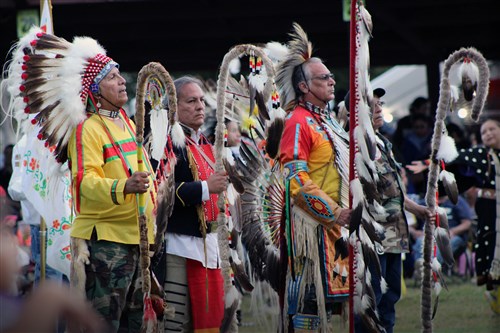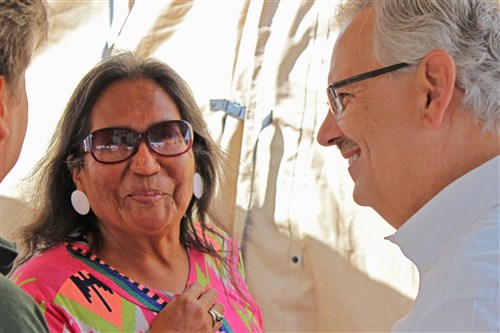
Walking together
 The message below was originally delivered at a March 16 event at which Minnesota United Methodists gathered to watch the film “Disavowing the Doctrine of Discovery—Unmasking the Domination Code.” The event was sponsored by the Native American Ministry Action Team and held at Centennial United Methodist Church’s St. Anthony Park campus in St. Paul.
The message below was originally delivered at a March 16 event at which Minnesota United Methodists gathered to watch the film “Disavowing the Doctrine of Discovery—Unmasking the Domination Code.” The event was sponsored by the Native American Ministry Action Team and held at Centennial United Methodist Church’s St. Anthony Park campus in St. Paul.
In the spring of 1973, I was a University Year for Action volunteer (part of the Vista Volunteer Program) on the Standing Rock Reservation in south central North Dakota and north central South Dakota. I was a live-in counselor in the Bureau of Indian Affairs boarding school in Fort Yates, North Dakota. I lived with Hunkpapa and Oglala junior high students who had come from the many villages throughout Standing Rock. The Boarding School, even in the early 1970s, was a repressive, culturally insensitive and systemically racist institution. And, I was a part of it! The entire first- through 12th-grade population of the boarding school dormitories was about 120 native students. We averaged three to four drug abuse (mostly glue and paint sniffing) or suicide (mostly wrist cutting) attempts a week.
On February 27, 1973, 200 Oglala Sioux and followers of the American Indian Movement seized and occupied the town of Wounded Knee on the Pine Ridge Reservation in South Dakota. This occupation was to call attention to the yet-unreported massacre of over 400 Hunkpapa Lakota (Sioux) by the United States Army on December 29, 1890 near Wounded Knee Creek. Half of those killed were women and children.
During the occupation of Wounded Knee, all the paint sniffing and suicide attempts stopped. One evening, several of the boys were gathered in my room. In the midst of our conversation, I made this observation and asked the boys if they could tell me why. All eyes immediately looked to the floor and the room went silent. I asked again. Finally, one young man spoke up and said, “This is the first time we have felt like warriors.”
Now, it is important to know that a Lakota warrior is not a GI Joe, “oohrah” Marine type. A Lakota warrior is a man who demonstrates courage and integrity and is committed to protecting his people’s lives and culture.
Those Hunkpapa and Oglala young men were telling me that today, our identity, our pride, our sense of meaning and purpose has been restored.
The Doctrine of Discovery, first articulated by Roman Catholic Pope Nicholas V in a Papal Bull in 1452 has served as the basis of justifying war against all non-Christians throughout the world and sanctioning and promoting the conquest, colonialization, and exploitation of non-Christian nations and their territories for nearly 500 years. This doctrine is reflected in our Declaration of Independence and was enshrined in our law through the 1823 Supreme Court case of Johnson vs. McIntosh. The ruling, as yet not overturned, observed that Christian European nations had assumed dominion over the lands of America upon discovery and that Indians had lost their rights to complete sovereignty as independent nations and retained a mere right of occupancy in their lands.
This doctrine is a deeply embedded part of our nation’s insidious white privilege and institutional racism and continues to this very day to shape our prejudices, relationships, and actions with Native Americans.
I am convinced that the unspoken Doctrine of Discovery drove the company constructing the Dakota Access Pipeline Company, the political leaders of North Dakota, and the Army Corp of Engineers to abandon the original route of the pipeline north of Bismarck and across farmland owned by white farmers and pursue a route across historically sacred and treaty-guaranteed lands of the Standing Rock Tribe.
The application of the Doctrine of Discovery—stated or assumed—has robbed the Native Americans of this continent (and elsewhere in the world) of much more than their land. Like the young men in that dorm room in 1973, it has robbed the people of their identity, of their culture, of their souls.
Jesus’ blunt teaching about the judgment of the nations in Matthew 25 rings in my ears. Please allow me some hermeneutical liberty here:
“Lord, when did we see you made to feel ashamed of your culture or worthless and did not speak up?
Lord, when did we see the powerful and privileged steal your land and did not advocate for justice?
Lord, when did we see your very soul, your very identity, defeated and did not honor who you are?”
The General Conference of the United Methodist Church took action in 2012 to “condemn the Doctrine of Discovery as a legal document and basis for seizing of native lands and abuses of human rights of Indigenous Peoples and resolved to work toward eliminating the Doctrine of Discovery as a means to subjugate Indigenous peoples of property and land”—and, I would add, culture and identity.
As a bishop of The United Methodist Church and a North Dakotan who is the product of the application of this doctrine and its inherent racism, I am committed to the fulfillment of the General Conference resolution. It is time to bury the Doctrine of Discovery forever. The resolution is a start to the long road of true repentance and restoration.
The resolution is a start to the long road of true repentance and restoration.
Photo: Phyllis Young and Bishop Ough at the Oceti Sakowin camp on Sept. 10, 2016.
But we also need to embrace the fullness of the scripture’s teachings about justice. We see in the Hebrew scriptures that for Yahweh, justice literally meant returning things to their rightful owners or to their rightful place or to a right relationship.
Justice will only be fulfilled when those who have been privileged by the Doctrine of Discovery are returned to a right relationship with those who have been victimized by the doctrine.
Justice will only be fulfilled when the sovereignty of Native peoples is recognized and they are present (returned) to the corporate board rooms and legislative halls where decisions are being made about their lands and their water.
In our context here in Minnesota and the Dakotas, justice will be fulfilled and we will take a significant step on the journey toward true repentance when the sacred Red Rock is returned to the Dakota people.
Justice will be fulfilled when we—Native Americans and non-Native Americans, U.S. citizens and refugees—are returned to a state of loving one another as God loves us.
We would do well to replace the Doctrine of Discovery with a Doctrine of Love First. Moses articulated this when he gathered the tribes of Israel and gave his farewell speech. You may recall this “choose life” speech from Deuteronomy. Before the people entered a land that was not theirs, he told them they could choose life or death. The way of life was “loving the Lord your God and walking in God’s ways” (Deuteronomy 30:16). The way of death was to abandon the ways of God and live only for self. And, of course, Jesus said the same thing to the lawyer who quizzed him about abundant and eternal life: “Love the Lord your God with all of your heart, mind, soul, and strength, and your neighbor as yourself.”
The psalmist, praying for the restoration of God’s favor, gives us a wonderful image of justice—the kiss of righteousness and peace. Listen to this beautiful poetry:
righteousness and peace will kiss each other.
Faithfulness will spring up from the ground,
and righteousness will look down from the sky.”
Psalm 85:10-11
I invite each of you, as we seek to walk together, to join me in working for that day when God’s vision of justice is fulfilled—when righteousness and peace kiss; when faithfulness springs up from the earth and righteousness looks down from the sky; when everything is returned to its rightful owners, to its rightful place, and to right relationships. May it be so on earth as it is in heaven!
Bishop Bruce R. Ough is resident bishop of the Dakotas-Minnesota Area of The United Methodist Church.